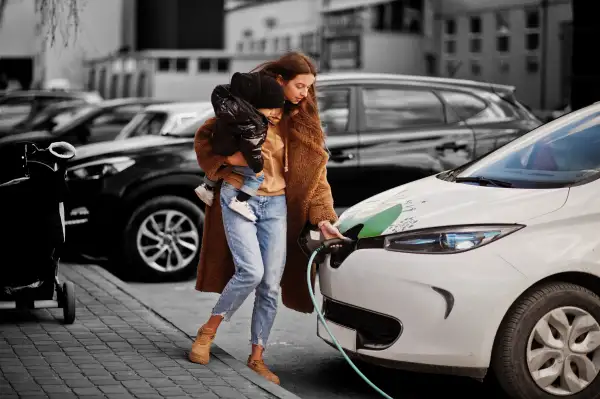Why It's the Best Time Ever to Buy an EV

Automakers and car dealerships are improving promotions and deals on electric vehicles due to a lack of consumer demand, making it arguably the best time ever to buy an EV.
The average discount on fully electric vehicles was about $2,600 in October, a big swing from a year ago when EV buyers in the U.S. were paying an average of more than $1,000 above the sticker price, according to Edmunds.
What's more, the end of the year is usually the best time to find deals on new cars in general as dealerships try to clear out their inventory, and automakers are ramping up holiday promotions on EVs like 0% APR financing offers to try to bolster sluggish sales.
Thanks to the EV tax credit, price discounts and incentives like cash rebates, Americans can get new EVs for thousands of dollars less than the sticker.
The average discount for EVs is much larger than the average discounts for hybrids ($394) and gas-powered cars ($1,031), largely because EV inventory levels are higher. The discount refers to the difference between the average transaction price of a vehicle ($59,064 for EVs) and the average manufacturer's suggested retail price.
MSRPs have also decreased on many EV models since Tesla and Ford got in a price war last winter. Dealerships are often selling EVs at reduced prices because they have too much inventory, but EVs are still piling up on their lots.
According to Cox Automotive, EV days’ supply (the time it would take for the available inventory to sell at the current sales pace) is about 100 days. That’s far more than the level considered normal of 60 days, and the excess means dealerships and automakers are under pressure to increase sales.
"Electric vehicle adoption is happening much slower than expected," Brian Finkelmeyer, senior director of new car solutions at Cox, said in a recent report. "The looming question on everyone’s mind is whether the market has reached peak demand for the current EV offerings."
Regardless of consumer demand, restrictions on gas-powered car sales are in the works from both states and the federal government. The Environment Protection Agency plans to impose rules that would basically require that 67% of new car sales be electric vehicles by the 2032 model year.
The current market share of EVs is about 7.5% among all new car sales, according to Edmunds. While EVs are growing in popularity, it's not happening at the pace automakers or the government had anticipated.
In a letter to the Biden administration Tuesday, a coalition of almost 4,000 auto dealerships called for a slowdown in the transition to EVs, stating that they're struggling to sell EVs even with price cuts, manufacturer incentives and government incentives.
"Currently, there are many excellent battery electric vehicles available for consumers to purchase. These vehicles are ideal for many people, and we believe their appeal will grow over time. The reality, however, is that electric vehicle demand today is not keeping up with the large influx of BEVs arriving at our dealerships," the letter said.
The challenges dealerships are facing play to the advantage of consumers. Though new EVs are still usually in the luxury price range, Americans shopping right now can find some of the best prices and deals ever.
Used EV prices keep falling
If a new EV is out of your budget, used EVs have also become much more affordable. Used EV prices are down a staggering 33.7% in the past year, according to iSeeCars.com. For example, the average used price for a Tesla Model 3 is $33,455, nearly $15,000 less than the price a year ago of $48,171.
Like new EVs, used battery-powered cars are eligible for a federal EV tax credit. The maximum tax credit is $4,000 for used EVs and $7,500 for new EVs.
If you’ve been thinking about buying an electric vehicle and you can secure an attractive auto loan rate, it’s an optimal time to do so considering the current prices and discounts, and you may not want to wait: While deals will likely be plentiful through the end of the year, the market could look different in 2024.
There are signs the inventory glut won't last forever. Manufacturers are cutting back their EV production plans after realizing they overproduced this year. GM scrapped a goal of producing 400,000 EVs by the middle of next year and delayed a $4 billion electric truck project in Michigan, while Ford announced it's postponing $12 billion of EV investments.
One more reason to consider year-end EV shopping: A number of models could lose eligibility for tax credits starting Jan. 1 because the government's battery requirements for the credit get stricter each year. While it’s unclear how many vehicles will be affected, the impacts could be significant, according to Kelley Blue Book. Tesla, for example, has a note on its website telling customers that the Model 3 could lose half the tax credit ($3,750) at the end of 2023.
More from Money:
EV Sales Are in a Slump — Why Aren’t More Car Buyers Going Electric?
The Best Electric Cars of 2023

